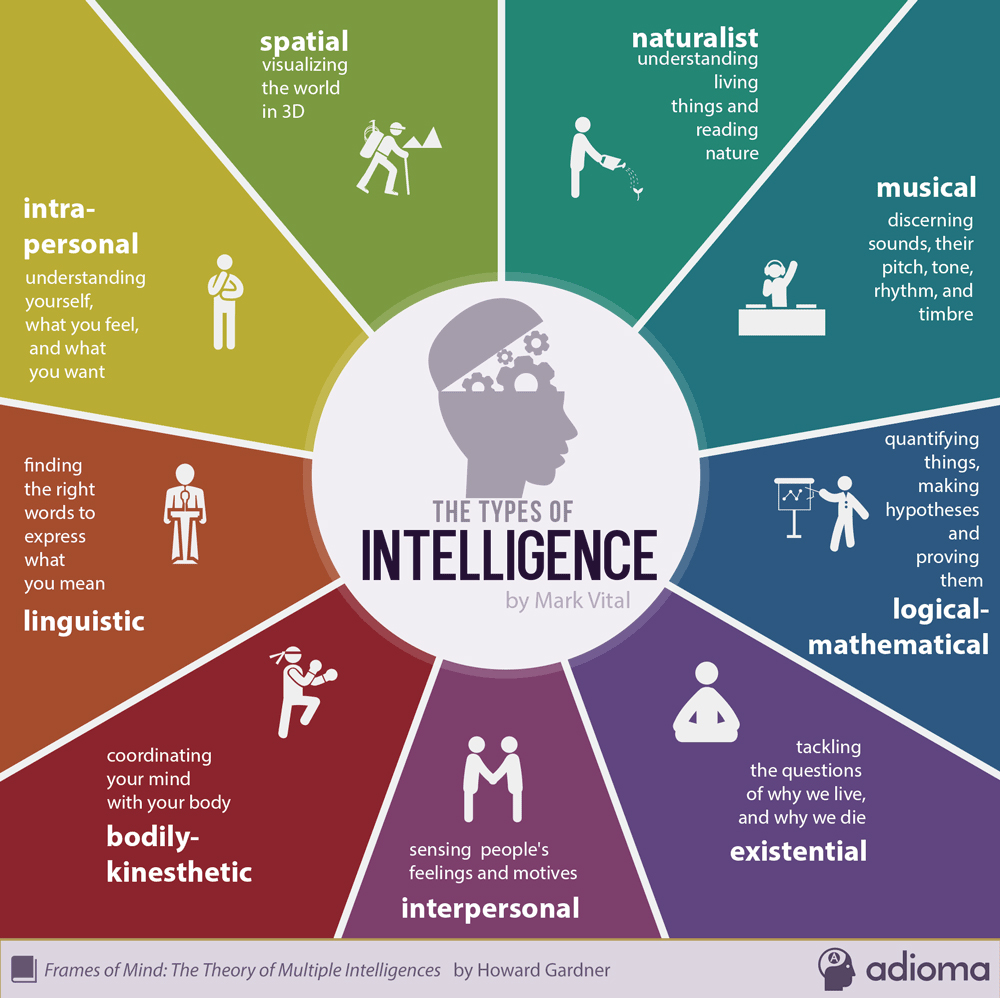Multiple Intelligence Theory
There Is More To You Than Meets The IQ Test
Gardner's Multiple Intelligence Theory Suggests That You May Be More Intelligent Than You Thought You Were!

What is Multiple Intelligence Theory?
[1] Multiple intelligence theory proposes that there is more than one type of intelligence, and it expands the concept of intelligence beyond the traditional general intelligence to a range of 8 intelligences consisting of:
- Linguistic
- Logical/Mathematical
- Spatial
- Bodily-Kinesthetic
- Musical
- Interpersonal
- Intrapersonal
- Naturalist
[2] Multiple also intelligence theory proposes that you are not born with all the intelligences you will ever have and that intelligences develop in relation to your life experiences.
[3] Multiple also intelligence theory proposes that you have a distinct intellectual profile [comprising multiple intelligences] and that profle will be determined by your life experiences.
Multiple Intelligence Theory developed by Harvard professor of education Dr. Howard Gardner, and first published (in 1983) in his book, "Frames of Mind: The Theory of Multiple Intelligences".
Gardner developed MI theory in the late 1970s and early 1980s. In doing so, he drew on evidence from a wide variety of sources, disciplines, and research traditions.
The theory is a critique of the standard psychological view of
intellect: that there is a single intelligence, adequately measured by
IQ or other short answer tests.
On the basis of his research, Gardner claimed that human beings have a number of relatively discrete intellectual capacities. Whereas IQ tests assess linguistic and logical-mathematical intelligence, and sometimes spatial intelligence; and they are a reasonably good predictor of who will do well in a traditional modern secular school.
But Gardner suggested that the traditional way of measuring intelligence by I.Q testing is far too restrictive and is biased to certain types of individuals with over emphasis on reading, writing and arithmetic skills alone, and a person’s future success is judged accordingly.
Garner concludes that everybody’s mind is different, and that no two profiles of intelligence are the same.
For an expanded overview and summary critical evaluation:
Gardner's Theory of Multiple Intelligence
A personal experience
I had a direct experience of this several years ago that confirmed my own opinion of the restrictive nature of the traditional IQ test.
My daughter was at that time an assistant psychologist in a young offenders institution and in preparation for some research tests that she was going to conduct, she undertook some preliminary tests on me. The test was preceded by an intelligence test.
When I took the test I was tired, and feeling stressed and little hung-over and I did not feel that I performed particularly well!
However, when she later showed me the results of the test it indicated a very high IQ score - but what was particularly noticeable to me was that the questions in the IQ test favoured a white, middle-aged, middle class person like me with a strong academic grounding in a classical/grammar school education. Someone of far greater intelligence than me, but who hadn't had the benefit of my type of education would have scored quite poorly.
Resources
Here is a more detailed description of:
The Official Authoritative Site of Multiple Intelligences
Closely related to this model is the VAK [visual, auditory, kinesthetic] learning styles model.
Try this test: VAK Learning Styles Self-Assessment Questionnaire
In depth resources: www.howardgardner.com
This article delves into the misconceptions surrounding learning styles, explores the VARK model, and clarifies the distinction between learning styles and learning preferences. It also provides insights into 14 study methods tailored to various learning preferences.
Using Learning Styles to Your Advantage: the Complete Guide
Return to: Managing Personal Change
LATEST ARTICLES
Living in Survival Mode Without Surrendering Mental Authority
Master The Season You Are In - The Key to Fulfilling Your Purpose
 To fulfil your purpose, you must first master the season you are in. One of the biggest mistakes you can make in life is focusing all your energy on the next season instead of learning to master the s…
To fulfil your purpose, you must first master the season you are in. One of the biggest mistakes you can make in life is focusing all your energy on the next season instead of learning to master the s…Manifestation Without Magic: A Practical Model
 Manifestation without magic is not a softer or more intellectual version of popular manifestation culture. It is a different model altogether. Popular manifestation teachings tend to frame reality as…
Manifestation without magic is not a softer or more intellectual version of popular manifestation culture. It is a different model altogether. Popular manifestation teachings tend to frame reality as…Staying Committed When You Can't See Progress - The Psychology of Grit
 Uncertainty Is Not The Absence Of Progress, Only The Absence Of Reassurance. One of the most destabilising experiences in modern life is not failure, but uncertainty and staying committed when you can…
Uncertainty Is Not The Absence Of Progress, Only The Absence Of Reassurance. One of the most destabilising experiences in modern life is not failure, but uncertainty and staying committed when you can…The Battle For Your Mind - How To Win Inner Freedom In A Digital Age Of Distraction
 From External Events to Inner Events. We often think of “events” as things that happen out there: the traffic jam, the rude comment, the delayed email reply. But what truly shapes our experience is wh…
From External Events to Inner Events. We often think of “events” as things that happen out there: the traffic jam, the rude comment, the delayed email reply. But what truly shapes our experience is wh…How to See Your Thoughts Without Becoming the Story
 A Practical Guide to Thought-Awareness. You can spend your life inside the stories of your mind without ever learning how to see your thoughts clearly and objectively. Most of the stuff we tell oursel…
A Practical Guide to Thought-Awareness. You can spend your life inside the stories of your mind without ever learning how to see your thoughts clearly and objectively. Most of the stuff we tell oursel…The Collison Decision Matrix - A Simple Framework for Better Choices
 The Collison Decision Matrix Is A Practical Everyday Thinking Tool. Most of us spend a surprising amount of time worrying about decisions. From small ones such as what to wear, what to eat, what to te…
The Collison Decision Matrix Is A Practical Everyday Thinking Tool. Most of us spend a surprising amount of time worrying about decisions. From small ones such as what to wear, what to eat, what to te…The Power Of Asking The Right Question
 The Power Of Asking The Right Question Lies In The Quest For Insight. To experience the power of asking the right question you must develop the practice of asking questions. The best way to improve th…
The Power Of Asking The Right Question Lies In The Quest For Insight. To experience the power of asking the right question you must develop the practice of asking questions. The best way to improve th…Site Pathways
 Here is a site pathway to help new readers of Zen-Tools navigate the material on this site. Each pathway is based around one of the many key themes covered on this site and contain a 150 word introduc…
Here is a site pathway to help new readers of Zen-Tools navigate the material on this site. Each pathway is based around one of the many key themes covered on this site and contain a 150 word introduc…How To Live With Contradiction - Beyond Thought Let Stillness Speak
 A major impact on so many peoples' lives is the situational contradiction of unfilled realistic expectations. So where does all this leave us? Well here we are, with mental equipment that is more lim…
A major impact on so many peoples' lives is the situational contradiction of unfilled realistic expectations. So where does all this leave us? Well here we are, with mental equipment that is more lim…How To Trust The Process Of Mindfulness - Right Now
 In mindfulness, the process isn’t some distant goal — it's what is happening right now. When we talk about how to trust the process of mindfulness the credibility of the process is heavily dependent…
In mindfulness, the process isn’t some distant goal — it's what is happening right now. When we talk about how to trust the process of mindfulness the credibility of the process is heavily dependent…Inner Mastery For Outer Impact - Mental Clarity For Effective Action
 Insights only matter if they translate into consistent action. In a world crowded with quick fixes and motivational soundbites, the theme “Inner Mastery for Outer Impact” calls us to something more e…
Insights only matter if they translate into consistent action. In a world crowded with quick fixes and motivational soundbites, the theme “Inner Mastery for Outer Impact” calls us to something more e…